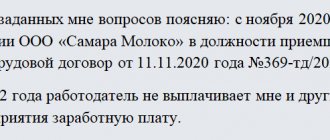Commentary on Article 302 of the Code of Criminal Procedure of the Russian Federation
1. The commented article establishes that a court verdict can be of two types - acquittal or conviction. In addition, when a person is accused of committing several crimes, a verdict may be passed in which the person was found innocent of some parts of the charge, and guilty of others. Accordingly, the verdict can be acquittal in one part and guilty in another.
2. Part 2 of the commented article establishes an exhaustive list of grounds for an acquittal, one of which must be indicated in the text of the document.
3. If the defendant was charged under several articles of the criminal law, then the operative part of the sentence must indicate exactly which of them the defendant was acquitted of and which of them he was convicted of (Part 2 of Article 308 of the Code of Criminal Procedure of the Russian Federation).
4. The event of a crime is considered unidentified if in the criminal case there are no circumstances confirming the very fact of the criminal act.
5. The defendant is recognized as not involved in the commission of a crime when there is no specific evidence in the criminal case confirming the commission of the crime by this particular person.
6. In order for an acquittal to be made due to the absence of corpus delicti in the defendant’s act, it is sufficient that at least one of the elements of the crime is not established in his actions (inaction) - the object of the crime, the objective side of the crime, the subject of the crime, the subjective side of the crime .
7. The inclusion in the acquittal sentence of language calling into question the innocence of the acquitted person is not allowed (Part 2 of Article 305 of the Code of Criminal Procedure of the Russian Federation).
8. An acquittal leads to the rehabilitation of a person (Chapter 18 of the Code of Criminal Procedure of the Russian Federation).
9. Due to the principle of the presumption of innocence (Part 4 of Article 14 of the Code of Criminal Procedure of the Russian Federation), a conviction cannot be based on assumptions, and all irremovable doubts about the proof of the accusation, including its individual components (form of guilt, degree and nature of participation in the crime) crimes, mitigating and aggravating circumstances, etc.) are interpreted in favor of the defendant. The defendant's admission of guilt, if it is not confirmed by the totality of other evidence collected in the case, cannot serve as the basis for a guilty verdict.
This rule applies regardless of what type of conviction was made (with the imposition of a sentence to be served by the convicted person, with the imposition of a punishment and release from serving it, or without the imposition of a punishment).
10. Part 8 of the commented article contains an algorithm for the court’s actions if there are grounds for termination of a criminal case and (or) criminal prosecution. The court continues to consider the criminal case in the usual manner if the following grounds for termination of the criminal case and (or) criminal prosecution are discovered: absence of a crime; absence of corpus delicti in the act; expiration of the statute of limitations for criminal prosecution (clauses 1–3, part 1, article 24 of the Code of Criminal Procedure of the Russian Federation); non-involvement of the defendant in the commission of the crime; the presence of an amnesty act (clauses 1 and 3 of part 1 of article 27 of the Code). As a result of consideration of the case, the court issues a guilty verdict with the release of the convicted person from punishment if the statute of limitations for criminal prosecution has expired or an amnesty act has been issued. In other cases, the court is obliged to issue an acquittal.
Article 302. Types of sentences
Article 302. Types of sentences
[Code of Criminal Procedure] [Part Three] [Title IX] [Chapter 39]
. The court verdict may be acquittal or guilty.
. An acquittal is rendered in cases where:
- 1) the event of the crime has not been established;
- 2) the defendant is not involved in the commission of a crime;
- 3) there is no corpus delicti in the defendant’s act;
- 4) a verdict of not guilty was rendered against the defendant by the jury.
. Acquittal on any of the grounds provided for in part two of this article means recognizing the defendant as innocent and entails his rehabilitation in the manner established by Chapter 18 of this Code.
. A conviction cannot be based on assumptions and is made only on the condition that during the trial the defendant’s guilt in committing a crime is confirmed by the totality of the evidence examined by the court.
. The verdict of guilty is:
- 1) with the imposition of a sentence to be served by the convicted person;
- 2) with the imposition of a sentence and release from serving it;
- 3) without imposing punishment.
. The court makes a guilty verdict in the case provided for in paragraph 2 of part five of this article, if by the time the verdict is pronounced:
- 1) an act of amnesty has been issued, exempting the convicted person from the punishment imposed by this sentence;
- 2) the time the defendant is in custody in this criminal case, taking into account the rules for offsetting the punishment established by Article 72 of the Criminal Code of the Russian Federation, absorbs the punishment imposed on the defendant by the court.
. When rendering a conviction and imposing a sentence to be served by the convicted person, the court must accurately determine the type of punishment, its amount and the beginning of the calculation of the term of serving.
. If the grounds for termination of a criminal case and (or) criminal prosecution specified in paragraphs 1 - 3 of part one of Article 24 and paragraphs 1 and 3 of part one of Article 27 of this Code are discovered during the trial, then the court continues to consider the criminal case in the usual manner until his permission on the merits. In the cases provided for by paragraphs 1 and 2 of the first part of Article 24 and paragraphs 1 and 2 of the first part of Article 27 of this Code, the court issues an acquittal, and in the cases provided for by paragraph 3 of the first part of Article 24 and paragraph 3 of the first part of Article 27 of this Code, - a guilty verdict with the release of the convicted person from punishment.
The biggest mistake of the legislator?
Before dispensing justice, it is very important to repair the machine of justice. Evgeniy Khankin
Part 6 art. 259 of the Code of Criminal Procedure of the Russian Federation on the preparation of a protocol within three days from the date of the end of the court hearing obviously contradicts the Constitution of the Russian Federation. This means that sentences are not made on the basis of the trial record.
Let us consider the essence of a serious procedural problem.
In accordance with Part 6 of Art. 259 of the Code of Criminal Procedure of the Russian Federation: “ The protocol must be prepared and signed by the presiding officer and the secretary of the court session within 3 days from the date of the end of the court session.
The protocol during a court session can be prepared in parts, which, like the protocol as a whole, are signed by the presiding officer and the secretary. At the request of the parties, they may be given the opportunity to familiarize themselves with parts of the protocol as they are prepared.”
Taking into account the fact that, according to Part 6 of Art. 259 of the Code of Criminal Procedure of the Russian Federation, the protocol must be prepared within three days from the date of the end of the court session; it turns out that sentences in criminal cases in accordance with Chapter 39 of the Code of Criminal Procedure of the Russian Federation are passed in the deliberation room, when the protocol of the court session on them has not yet been prepared.
In the absence of a ready protocol, a verdict cannot be passed
When at the time of sentencing there is no prepared protocol of the court session, the judge cannot be guided by anything else, in particular, his personal records, notes, etc., since the Code of Criminal Procedure of the Russian Federation does not provide for such a possibility. On the contrary, according to Part 1 of Art. 245 of the Code of Criminal Procedure of the Russian Federation, the secretary of the court session, and not the judge, keeps the minutes of the court session.
The possible argument that the judge pronounces a sentence on the basis of some draft notes of the secretary cannot serve as a justification for the established procedure, since such notes do not meet the requirements for evidence of Articles 74, 75 of the Code of Criminal Procedure of the Russian Federation. The secretary's notes on court hearings acquire legal force only after the final production of the protocol and its signing by the judge.
The possible argument that judges, being in the deliberation room without a ready-made protocol, are able to pass sentences from memory is untenable and ridiculous. This is possible if the RAM of the average judge's brain is equal to the RAM of the average computer. Even judges who have a phenomenal memory (of which there are few) will begin to forget what they heard after a few months, and by the time the verdict is pronounced, they will lose from their memory many important details of the testimony and the battles that took place. And, in fact, why pass a verdict from memory if the Code of Criminal Procedure provided the necessary clue in the form of a protocol of the court hearing?
Apologists part 6 art. 259 of the Code of Criminal Procedure of the Russian Federation can only give one decent argument: in the country, 70% of all criminal cases are considered in a special manner, where the minutes of the court session in the deliberation room are not needed at all. But, fortunately, it is not yet 100%, and therefore, the identified problem concerns 30% of all cases, and this is no less than about 300,000 cases a year.
In the absence of a prepared protocol of the court session, while in the deliberation room, the judge cannot fulfill the requirements of a number of procedural norms.
So, in accordance with Part 4 of Art. 302 of the Code of Criminal Procedure of the Russian Federation “a conviction cannot be based on assumptions and is decided only on the condition that during the trial the defendant’s guilt of committing a crime is confirmed by the totality of evidence examined by the court
"
The court cannot resort to examined evidence when the protocol is not yet ready.
In accordance with Art. 307 of the Code of Criminal Procedure of the Russian Federation “the descriptive and motivational part of the guilty verdict must contain:
1) a description of the criminal act recognized by the court as proven, indicating the place, time, method of its commission, form of guilt, motives, goals and consequences of the crime;
2) the evidence on which the court’s conclusions regarding the defendant are based, and the reasons for which the court rejected other evidence;
3) an indication of the circumstances mitigating and aggravating the punishment, and if the charge is recognized in any part as unfounded or the crime is incorrectly classified - the grounds and motives for changing the charge;
4) motives for resolving all issues related to the imposition of a criminal punishment, release from it or its serving, and the application of other measures of influence.” It is obvious that the court, without a ready-made protocol of the court hearing, is not able to state the descriptive and motivational part of the guilty verdict, provide the evidence on which the court’s conclusions regarding the defendant are based, and the reasons for which the court rejected other evidence, and resolve other issues provided for in Art. 307 of the Code of Criminal Procedure of the Russian Federation.
In the absence of a prepared protocol of the court session, the court does not have the right to draw conclusions about the defendant’s guilt in committing a crime.
This means that the entire Code of Criminal Procedure of the Russian Federation with its norms, rights, obligations and guarantees turns into a fiction, since the judicial act issued is initially illegitimate.
Preparation of the protocol in parts does not help either.
Although according to Part 6 of Art.
259 of the Code of Criminal Procedure of the Russian Federation “the protocol during the court session can be prepared in parts, which, like the protocol as a whole, are signed by the presiding officer and the secretary,”
which does not exclude the possibility of preparing the protocol of the court session in most of it at the time of sentencing, however, this norm does not protect against violation of constitutional rights.
Firstly, according to its meaning, the protocol can
be prepared in parts, that is, the judge has the right, but is not obliged, to prepare it before passing a sentence. In the vast majority of criminal cases, judges refuse to prepare the entire court record before sentencing, explaining this by the heavy workload of their secretary.
Secondly, the protocol during the court hearing can be prepared in parts and made available for review to the parties only upon their request.
So, according to Part 7 of Art. 259 of the Code of Criminal Procedure of the Russian Federation “a request for familiarization with the minutes of the court session is submitted by the parties in writing within 3 days from the date of the end of the court session.”
If there is no request, the court will not prepare the protocol in parts.
Thirdly, according to established practice, in almost all criminal cases the minutes of the court hearing are prepared after the verdict is passed.
Fourthly, even if we assume that the protocol at the request of the party could be prepared during the court session, it would in any case be incomplete, since it would not include the important stage of the judicial debate, where the parties present their position in a consolidated form, what is most important for the court when rendering a judicial act.
Established on the basis of Part 6 of Art. 259 of the Code of Criminal Procedure of the Russian Federation, law enforcement practice, when at the time of judicial debate the court record is not yet ready, contributes to the fact that the parties present their arguments based on the subjective perception of the evidence examined in court, and not on the official record, the accuracy of which they have previously verified in the prescribed manner and approved by the court.
Formal and useless procedure
Part 7 art. 259 of the Code of Criminal Procedure of the Russian Federation is also contrary to the Constitution of the Russian Federation, since it represents an empty and formal procedure for submitting comments on the protocol of a court session, when the verdict has already been passed and the testimony of the interrogated persons is presented in an interpretation convenient for the court.
The law provides that comments on the protocol are considered by the presiding officer. However, it is not taken into account that the presiding officer, after making a court decision and preparing a protocol under this decision, can no longer objectively consider the submitted comments, since he is interested in leaving the submitted comments unsatisfied, and appeals and submissions - without changes.
The judge cannot certify the correctness of the submitted comments, since he has already rendered a verdict and stated the testimony in it, and editing the testimony in the protocol will cause the verdict to be inconsistent with the protocol of the court session, which may lead to the cancellation of the verdict.
Solution
It is quite obvious that changes must be made to the Code of Criminal Procedure of the Russian Federation: the protocol of the court session must be prepared before the start of the judicial debate, the parties must have the opportunity to familiarize themselves with it in advance, make comments, and the judge must consider them in the prescribed manner.
When the court leaves for the deliberation room, it must take with it not only perceptions, sensations and ideas about what it heard and saw, but also the protocol of the court session prepared and verified by the parties.
Given the current extremely strange procedural procedure for preparing the minutes of a court hearing after a verdict has been passed, it is not at all surprising that judges often write in sentences not what took place in court hearings, but what they want, and reject comments on their improvisation without a shadow of embarrassment.
Parts 6, 7 art. 250 and Art. 260 of the Code of Criminal Procedure of the Russian Federation are the most blatant examples of legal nonsense.
The result of Art. 259 of the Code of Criminal Procedure of the Russian Federation in its current version become violations of the rights of citizens to a fair trial, established by Art. 6 of the Convention for the Protection of Human Rights and Fundamental Freedoms, as well as violations of a number of norms of the Constitution of the Russian Federation (Part 1 of Article 46, Part 1 of Article 49, Part 3 of Article 123 and others).
My appeal to the Constitutional Court of the Russian Federation with a complaint about the unconstitutionality of Part 7 of Art. 259 of the Code of Criminal Procedure of the Russian Federation was returned by letter dated August 30, 2016 on formal grounds.
But is it acceptable to remain indifferent to such a blatant and glaring procedural problem in domestic justice?
The lawyer achieved in the Supreme Court the reversal of the sentence passed in the presence of confessional testimony of another person
On March 18, the Judicial Collegium for Criminal Cases of the Supreme Court of the Russian Federation issued a cassation ruling, which overturned the conviction and the acts of higher authorities that confirmed it in the case of beatings resulting in death.
The guilty verdict was passed without taking into account the confession of the accused's sister
On March 30, 2022, law enforcement officers discovered D.’s corpse in his home in the village of Gogino, Chelyabinsk region. According to investigators, the brother of the deceased’s wife M., who was staying there with his wife, was involved in the crime. According to law enforcement officers, it was during the quarrel that M. struck the victim multiple blows to the head, as a result of which D. died.
During the preliminary investigation, the widow of the deceased confessed that it was she who pushed her husband during a family quarrel, which is why he hit the corner and fell. Her brother M. ran out to the screams and began to provide first aid to the victim until the ambulance arrived. Nevertheless, the preliminary investigation authorities qualified M.’s actions under Part 4 of Art. 111 of the Criminal Code of the Russian Federation, a preventive measure was chosen against him in the form of a written undertaking not to leave the place and proper behavior.
The criminal case was heard in the Bredinsky District Court of the Chelyabinsk Region; during the trial, the defendant did not admit his guilt and refused to testify with reference to Art. 51 of the Constitution.
During the preliminary investigation and criminal proceedings, the interests of the accused were represented by the lawyer of the Administration of the Chelyabinsk Region, Gallia Sadrieva. The defense insisted on conducting a comprehensive forensic medical and situational examination, but the court refused to satisfy such a request.
At the court hearing, the widow of the deceased again confirmed that during a family quarrel she pushed D. away from her, who tried to hit her, causing her to hit her head against the wall. According to the woman, at that moment her husband had a mug in his hands, and when she pushed her husband away from her, he fell headlong towards the exit from the corridor and hit the corner.
Nevertheless, on October 21, 2022, the court of first instance convicted M. ("AG" has it). The court ignored the defense's arguments and the confession of widow D., who, according to the testimony of a number of witnesses, blamed herself for her husband's death. “The indicated explanations of D. contradict and are not confirmed by the conclusion of the medical examiner on the localization and mechanism of bodily injuries received by D., from which his death subsequently occurred due to direct at least three traumatic effects in the head area <…>. The defense's claim that D.'s death was accidental, including the damage could have been caused by the mug that was in D.'s hands, is untenable and is refuted by the conclusion of the medical examiner and the testimony of an expert, as well as the testimony of D., who did not explain in court and on at the place where the court examined the scene of the incident, that D. was hit in the face with a mug,” the verdict noted.
As the court explained, during the initial inspection of the scene of the incident, the mug to which the widow of the deceased began to refer several months after the incident did not appear. At the same time, he was critical of the testimony of a number of defense witnesses about the defendant’s non-involvement in the crime, citing the fact that they were not direct eyewitnesses of what happened.
Thus, M. was sentenced to 6 years in prison to be served in a maximum security penal colony. As mitigating circumstances, the court took into account M.’s confessional explanation; he has two young children; immoral behavior of the victim himself, who was intoxicated, insulted others and tried to hit his wife; provision of assistance by the accused to the victim immediately after the commission of the crime. At the same time, the court recovered from the defendant in favor of the deceased’s two sisters compensation for moral damage in the amount of 100 thousand rubles. each.
Higher authorities upheld the conviction
Next, M. and his lawyer, as well as one of the victims (D.’s daughter) appealed the verdict. The convict and his defense attorney indicated that M.’s guilt in committing the charged crime had not been proven, and the lower court ignored the testimony of the deceased’s widow about her involvement in the beating of the victim and her confession. According to M., he had a good relationship with the deceased and did not inflict any blows on the victim. In turn, the daughter of the deceased stated that her mother personally confessed to her the murder of her father, which occurred during a family quarrel between the spouses, and after the incident, M. ran out to the screams and began to provide medical assistance to her father.
However, the Judicial Collegium for Criminal Cases of the Chelyabinsk Regional Court only slightly changed the guilty verdict against M. Thus, from the descriptive and motivational part of the verdict when describing the criminal act, the indication that M. struck blows in the area of D.’s body and a number of bodily injuries were excluded, received by the victim. The operative part of the sentence was supplemented by an instruction to count the time of detention of the defendant as a suspect from April 1 to April 3, 2022, towards the term of serving the sentence.
“The guilt of the convicted M. in committing the criminal acts detailed in the verdict was established by evidence that received a proper assessment in accordance with the requirements of Art. 87–88 of the Code of Criminal Procedure of the Russian Federation, while the conclusions of the court, contrary to the arguments of the authors of the presentation and complaints, correspond to the actual circumstances of the criminal case. The reasoning presented by the court for its conclusions is convincing and based on the evidence examined. The court of first instance in accordance with the requirements of paragraph 2 of Art. 307 of the Code of Criminal Procedure of the Russian Federation cited the evidence on which he based his conclusions, and indicated the reasons for which he rejected other evidence. The conviction is based on a sufficient body of admissible, reliable and relevant evidence to the criminal case, properly assessed by the court. The evidence examined at the court hearing in an adversarial process fully confirms the guilt of the convicted person. At the same time, the court correctly conveyed in the verdict the essence of the position of the convict, refuted by specific evidence,” the appeal ruling noted.
The second instance added that the arguments of the appeals essentially boil down to a re-evaluation of the evidence collected in the criminal case, although the assessment of the evidence by the court of first instance was given in accordance with the requirements of Art. 17, 88 of the Code of Criminal Procedure of the Russian Federation, and all the collected evidence in its entirety is sufficient to resolve the case.
In turn, the Judicial Collegium for Criminal Cases of the Seventh Court of Cassation of General Jurisdiction also only slightly changed the sentence and the appeal ruling against M., reducing the sentence to 5 years and 6 months of imprisonment.
Arguments of complaints to the Supreme Court
M. and his lawyer sent cassation appeals to the Supreme Court of the Russian Federation (available to the editors) with a request to cancel the judicial acts issued in the criminal case and return it to the first instance for a new trial. They insisted that M. did not inflict bodily injuries on D. that led to his death, and that they were received by him under other circumstances. In their opinion, the evidence examined at the trial confirms the involvement in the crime of another person, whose testimony and confession the court was unreasonably critical of.
As noted in the complaints, the trial was biased: the court incorrectly stated the position of the defense on specific evidence, the court also unreasonably refused to satisfy a number of requests from the defense, in particular to recognize as material evidence and add to the materials of the criminal case the weapon of the crime - the mug that the victim bodily injuries were inflicted, and to conduct a comprehensive forensic medical-forensic situational examination.
M. and his defense attorney also drew attention to obvious contradictions in the testimony of witnesses, most of whom were not eyewitnesses to the incident. They also disagreed with the judicial assessment of the evidence, including the contradictory testimony of witness A., who was under pressure during the preliminary investigation. In addition, the complaints indicated that the court did not explain in the guilty verdict why it preferred some evidence and rejected others.
“According to Art. 14 of the Code of Criminal Procedure of the Russian Federation, all doubts about the guilt of the defendant, which cannot be eliminated in accordance with the Code of Criminal Procedure of the Russian Federation, are interpreted in favor of the defendant. The materials of the preliminary and judicial investigation contain information about various versions of the situation (versions). There are contradictions between the version of the investigative authorities, between the version of D., other witnesses, as well as the defense’s version of the totality of the circumstances of the incident,” noted the cassation appeal of defense attorney Gallia Sadrieva.
The Supreme Court revealed a number of violations during the consideration of the criminal case
At first, Supreme Court Judge Elena Zemskova refused to transfer the cassation appeal to the Judicial Collegium for Criminal Cases of the RF Supreme Court, but then the Chairman of the Supreme Court granted Gallia Sadrieva’s request.
The Judicial Collegium for Criminal Cases found that in the contested conviction, the court of first instance, in violation of Art. 297 and 307 of the Code of Criminal Procedure of the Russian Federation, when describing the criminal act, did not indicate the method of committing the crime, namely how the victim was struck. “The court also did not indicate what served as the basis for the emergence of personal hostility, what the unlawful behavior of the victim consisted of, what actions he committed and how they influenced the behavior of the convicted person. By virtue of Art. 14, 302 of the Code of Criminal Procedure of the Russian Federation, a conviction cannot be based on assumptions and is decided only if during the trial the defendant’s guilt in committing a crime is proven. In this regard, a guilty verdict must be based on reliable evidence, when all emerging versions of the case have been investigated, and existing contradictions have been clarified and assessed,” the Supreme Court concluded.
The highest court added that contrary to Art. 87 of the Code of Criminal Procedure of the Russian Federation, the lower court did not properly clarify and evaluate the contradictions in the evidence regarding the circumstances of causing bodily harm to the victim, and did not examine all the emerging versions of what happened. “Thus, the court did not fully include the testimony of witness D., given at the trial, in the verdict and did not give them a proper assessment. Meanwhile, from the testimony of the witness it follows that D. attacked her, pushed her, and held a mug in his hands. She waved him off and pushed him away from her. D. fell headlong towards the exit from the corridor and hit the corner. In response to her scream, M. ran out into the corridor and began to provide D. with first aid. During the mobile court hearing, D. confirmed her testimony and voluntarily gave the court a mug that was in the hands of the victim at the time of the conflict. At the same time, she showed that she could have hit D. with this mug during the fight,” the Supreme Court emphasized.
As the Court explained, refuting the defense’s arguments that M. was not involved in the crime, the court in its verdict referred to the conclusion of a forensic expert that the blunt head injury from which the victim died arose from several direct traumatic impacts to the head area. At the same time, at the court hearing, the interrogated expert Z. did not rule out the possibility of causing bodily harm to D. in the head area with a mug taken from the scene of the incident, while he stated in his testimony that such a question had not been asked before.
“This evidence indicated the need to conduct a comprehensive medical and forensic situational examination to clarify the emerging version of the infliction of bodily harm on the victim. However, the court refused to satisfy the corresponding request of the defense, unreasonably referring to the absence of any contradictions in the existing conclusion of the forensic expert, including those relating to the mechanism of formation of the victim’s injuries. Thus, the court actually left without verification the arguments of the defense that it was the mug seized by the court under the circumstances indicated by witness D. that could have caused bodily harm to the victim D.,” the Supreme Court concluded.
The Supreme Court overturned the judicial acts of the lower authorities and returned the case for a new trial to the court of first instance. At the same time, the Court chose a preventive measure against M. in the form of a written undertaking not to leave the place of detention instead of detention.
Defender's comment
In her commentary to “AG”, Gallia Sadrieva generally satisfactorily assessed the cassation ruling of the Supreme Court, noting that the case has grounds for its termination due to lack of proof of the accusation.
According to the lawyer, a positive result in the criminal case was achieved thanks to a clear line of defense formed at the stage of the preliminary investigation and in the court of first instance. “We have submitted numerous requests for additional investigative actions and several examinations. The court rejected the defense's motions, which resulted in the verdict being overturned. I don’t see any particular difficulty in this criminal case, however, in the proceedings of all judicial instances, from the first to the highest, it is not customary to take into account the arguments of the defense. Everything that the defense undertakes, the court boils down to the fact that it is blaming the defendant,” said Gallia Sadrieva.
Usually the court regards the arguments of the defendant and the defense as an attempt by the accused to evade responsibility, the lawyer noted. “Therefore, we are especially pleased by the conclusion of the RF Supreme Court that the lower courts did not take measures to fully and comprehensively consider both the arguments of the prosecution and the arguments of the defense. My principled position is that in this criminal case the position of the prosecutor in all judicial instances was not based on the norms of the law. Until the courts stop considering criminal cases only in the interests of the prosecution, and sentences and decisions of other courts are based on the norms of the constitution, Russian criminal proceedings will never be objective,” she emphasized.
Gallia Sadrieva also noted that in M.’s criminal case, even a representative of the Russian Prosecutor General’s Office asked the RF Armed Forces to refuse the cassation appeal, considering the verdict legal and justified. “Therefore, I believe that the Supreme Court made the only right decision. I would also like to note the need for a lawyer in a trial to have equal rights with a prosecutor, which is not currently the case in domestic legal proceedings,” the defense lawyer added.







